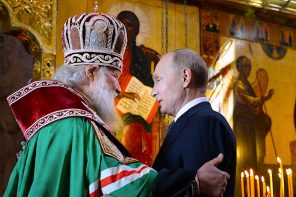On January 1, Romania implemented new tax codes that, among other changes, added the occupation of “witch” to the nation’s labor codes. Those charging clients for tarot readings, curses, and blessings must now pay a 16 percent income tax and make contributions to health and pension programs. The ire of the witches, some of whom responded by performing rituals to hex the government, has become fodder for scores of offbeat news stories throughout the west. But there is a deeper story to the witches of Romania. With Romania’s entry into the EU, an indigenous folk practice that was once persecuted under communism has come face to face with a global economy. The Romanian “witch tax” is a fascinating study in how the forces of modernity and globalization are shaping an ancient tradition.
One Person’s Psychic, Another Person’s “Witch”
Most cultures have figures that sociologist Max Weber categorized as “magicians,” individuals believed to have power over supernatural forces but who operate outside of an organized church. While priests lead congregations, magicians have “clients” who pay for private consultations. In the United States, such individuals are typically called “psychics.” In Romania they are called vrajitoares, or witches. They are almost exclusively female and many of them are of Roma or “gypsy” heritage. In 2006, it was estimated that there are some 4,000 witches in Romania. Travel guides advise tourists that witchcraft is a normal part of Romanian culture and that in rural areas it is still common for individuals to consult a witch before seeing a doctor. Many witches see themselves as loyal Romanians and conduct rituals to protect their country from natural disasters. In 2004, a ritual was done to curse Swiss referee Urs Meier, whose decision had cost Romania a qualifying match against Denmark for the European Football Championship. The hex was not fatal, but was intended to cost Meier his ability to whistle.
About four in five Romanians are Orthodox Christians. Unlike self-described witches in the United States and Western Europe, Romanian witches do not see their practice as a religious tradition distinct from Christianity. Instead their rituals appear to be syncretic, combining Christian and pre-Christian symbols. The sign of the cross is ubiquitous in witch rituals and some blessings require candles purchased from a church. However, the summer solstice is considered an important day for working magic and some rituals require the sacrifice of a chicken to faeries and other spirits. These elements suggest that witchcraft was in Romania long before the arrival of Christianity.
In 1947, King Michael was forced to abdicate the throne and Romania became a satellite of the Soviet Union. Under communism, witchcraft was officially banned. However, in the 1960s Elena Ceausescu (the wife of dictator Nicolae Ceausesecu) is said to have retained a witch known as Mama Omida or “Mother Caterpillar.” Mama Omida died in 1967 but is remembered as one of the most famous and powerful witches of Romania. Her daughter, Rodica Gheorge, is now among the most popular and wealthy witches in the country. She also has a blog featuring testimonials for her craft.
A National Center of Witchcraft?
Witches adapted to a free market quickly. Emerging businesses sought their aide, creating a growing clientele for witchcraft. In 1997, there was an attempt to form a “witches’ union,” in part to counter the claims of dozens of upstart witches that they were descendants of Mama Omida. In 1999, there was even a plan to build a thirty-five room “national center of witchcraft” on the outskirts of Bucharest. However, the witches appear to have become victims of their own success. The idea of taxing witchcraft was first put forward in 2001.
The following year, Romania’s television regulator proposed legislation banning witches from advertising on television. The ban was voted into law by parliament, despite a petition signed by the witches. While witches were still free to advertise in newspapers, this came as a blow. An elderly witch stated, “This makes me feel like I am back in communist times.” Driving this legislation was Romania’s intention to join the European Union. In fact, when the witches were unable to stop the ban by democratic means, they threatened to use their magic to keep Romania from joining NATO or the EU.
While witches enjoy popular support in Romania, many in the government view them as swindlers whose presence makes their country seem superstitious and backwards. In 2003, two witches in northwestern Romania were charged with fraud when their cures failed to work. Police encouraged villagers not to believe the claims of witches. Tensions grew as Romania prepared to enter the EU. British newspapers reported that more witches were learning English and raised concerns that disgruntled witches would flee Romania and set up shop in western EU nations. Andrei Chiliman, mayor of the First District in the capital of Bucharest, called for taxing witches. He also demanded greater resources to prosecute witches with fraud. He remarked, “If money from witchcraft can buy the kind of houses they have, it means witches must owe the State huge amounts of money. All we want to do is recover money and stop the fraud.”
Romania became an EU member in 2007. When public health concerns became an area of “shared competence” with the EU, it became possible for many witches to register as “alternative health care providers.” This greatly vexed Romania’s overworked community of doctors and further aggravated those who saw witches as a national embarrassment.
The last straw was a financial crisis: in 2009, Romania’s economy shrank by 7.1 percent. To pay state wages and pensions, the government negotiated a 20 billion-euro loan with the International Monetary Fund, the European Union, and the World Bank. To close the deficit, new sources of revenue were needed. Last September, Alin Popoviciu and Cristi Dugulescu of the ruling Democratic Liberal Party drafted a law wherein all witches and fortune-tellers would have to produce receipts. More problematic was the law’s specification that witches would be held liable if any predictions they made failed to pass. The senate initially voted down the legislation and Popoviciu accused his fellow legislators of being afraid of hexes. Instead, the witch tax was worked into new labor laws for 2011.
Cursing the Government
2011 began in Romania under a volley of curses. A group of witches conducted a ritual to curse the government in which mandrake was thrown into the Danube. The most outspoken opponent of the law has been the witch Bratara Buzea, 63. Buzea has a right to be mistrustful of the government. In 1977, she was herself imprisoned for her craft under Ceausescu. She has announced a particularly deleterious curse. The ritual, for which she will need the help of several fellow witches, apparently involves cat excrement and a dead dog. Her view of Romania’s need for revenue sounded not unlike the Tea Party in America, “They want to take the country out of this crisis using us? They should get us out of the crisis because they brought us into it.”
The United States is also home to a large class of fortune-tellers, who quietly pay their taxes. Why is Romania different? A global recession exasperated the situation in Romania. However, the heart of the matter appears to be not money but respect. The witches are primarily Roma—an ethnic group that long been disenfranchised and persecuted by governments throughout Europe. For witches like Buzea, the tax is simply an attempt to take what little she has by a government that dismisses her cultural traditions as fraud. Conversely, many Romanian legislators feel that the West has written off their country as the land of vampires and superstition. To them, witchcraft is not a popular religious practice or an ancient tradition but a plague of fraud and ignorance. It seems that tensions will diffuse when witches feel respected by their government and Romania feels respected by the West. A move toward resolution can be seen in a younger witch named Michaela Minca who said of the new law, “It means that our magic gifts are recognized and I can open my own practice.” We too can help to ease these tensions by not sniggering every time we are emailed a “news of the weird” article about Romania.




